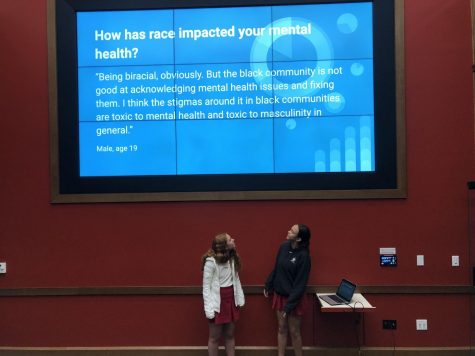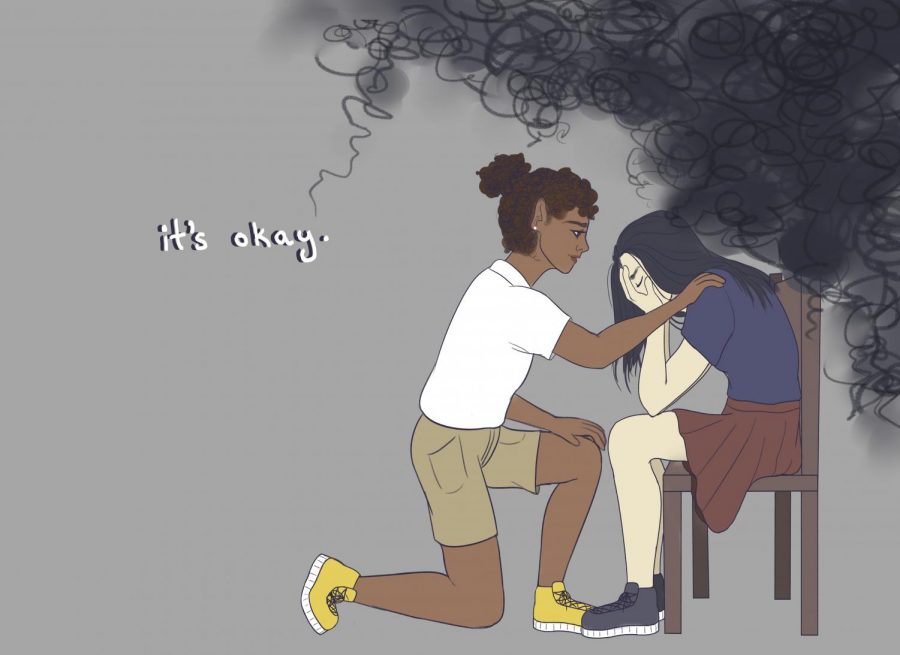Students Against Stigma and Unity Council host forum on mental health in POC Community
The SAS and Unity Council forum covered certain barriers that often prevent people of color from seeking and receiving adequate treatment.
“Stand up if you know somebody who feels that mental health issues represent laziness and weakness.”
A few seconds of silence passed, the students attending the forum glancing around at one another. Gradually, people began to stand, until nearly everyone in the Atrium was on their feet.
Students Against Stigma partnered with Unity Council on Feb. 6 to host a forum about the impacts mental health can have on people of color. The presentation by senior Louisa Sarofim and junior Noura Jabir was flush with personal experiences of former St. John’s students and eye-opening statistics regarding the correlation between mental illness and race.
Through the forum, Sarofim hoped to remove the shame surrounding mental illnesses in the St. John’s community.
“I’m hoping to really disseminate facts and to educate the student body, because destigmatization occurs when people see the prevalence of these disorders and then understand the factors that cause them on a more biological level,” Sarofim said.
Jabir and Sarofim specifically concentrated on the barriers that often prevent people of color from seeking and receiving adequate treatment. They touched on the economic and psychological obstacles such as lack of resources and feelings of inadequacy.
Barriers Preventing People of Color from Receiving Adequate Mental Health Treatment
-
Self-sufficiency: People of color may be more likely to suppress their emotions, as emotional dependence is seen as lazy and selfish in certain ethnic and cultural groups.
-
Spiritual beliefs: Many people with mental health issues are directed towards prayer, and suicide is seen as sinful in some religions.
-
Lack of resource accessibility: Certain therapists may not understand the cultural or ethnic perspective a patient is coming from. Moreover, a general physician might be biased to diagnosing certain disorders because their implicit biases may transcend the required cultural competency courses.
-
Success complex: Model minority myths often interferes with finding adequate treatment, such as the pressure for Asian Americans to be perfect or academically stronger than their peers.
-
Imposter complex: The collections of feelings of inadequacy that persist despite success, usually affected by the mental illness itself.

Senior Louisa Sarofim and junior Noura Jabir prepared an interactive presentation for the forum.
The students attending the meeting spanned all grades, with members of Unity Council, Students Against Stigma and others present. The diversity of the group allowed for dynamic discussion, with peers sharing their varying experiences. Even teachers who attended the forum had experiences and advice to share.
“Someone I knew explained having mental health issues as being similar to having broken a leg,” biology teacher Paula Angus said. “You wouldn’t expect that person to be able to do what they would normally do, so that was a great example to put mental health issues and the limitations they put on a person into perspective.”
Students Against Stigma plans to create a resource list of hotlines and local centers to distribute around campus as well as invite a guest speaker to present the impacts mental health has on LGBTQ+ individuals.
“The main message was to stay open and keep talking,” Upper School counselor Ashley Le Grange said. “Keep talking about things that are concerning regardless of barriers.”
*This article was updated on May 4, 2024 to reflect a name change.

Fareen Dhuka is a senior in her fourth year on Review. Her dream vacation is going to Disney World with Laney and she can't stop making overnight oats.

Julia is a senior, and this is her second year on Review. She loves fried calamari, but hates peanut butter with chocolate.

Celine is a senior in her fourth year on The Review. Her favorite animal is a wolf, and she loves having philosophical discussions and overthinking everything.













